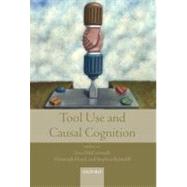
Note: Supplemental materials are not guaranteed with Rental or Used book purchases.
Purchase Benefits
What is included with this book?
| Notes on Contributors | p. vi |
| Tool Use and Causal Cognition: An Introduction | p. 1 |
| A Philosopher Looks at Tool Use and Causal Understanding | p. 18 |
| The Development of Human Tool Use Early in Life | p. 51 |
| Through a Floppy Tool Darkly: Toward a Conceptual Overthrow of Animal Alchemy | p. 69 |
| Causal Knowledge in Corvids, Primates, and Children: More Than Meets the Eye? | p. 89 |
| The Evolutionary Origins of Causal Cognition: Learning and Using Causal Structures | p. 89 |
| Tool Use, Planning, and Future Thinking in Children and Animals | p. 129 |
| Representing Causality | p. 148 |
| Why Do Language Use and Tool Use Both Count as Manifestations of Intelligence? | p. 169 |
| Effects of Brain Damage on Human Tool Use | p. 183 |
| Human Tool Use: A Causal Role in Plasticity of Bodily and Spatial Representations | p. 202 |
| Tool Use and the Representation of Peripersonal Space in Humans | p. 220 |
| Author index | p. 249 |
| Subject index | p. 251 |
| Table of Contents provided by Ingram. All Rights Reserved. |
The New copy of this book will include any supplemental materials advertised. Please check the title of the book to determine if it should include any access cards, study guides, lab manuals, CDs, etc.
The Used, Rental and eBook copies of this book are not guaranteed to include any supplemental materials. Typically, only the book itself is included. This is true even if the title states it includes any access cards, study guides, lab manuals, CDs, etc.